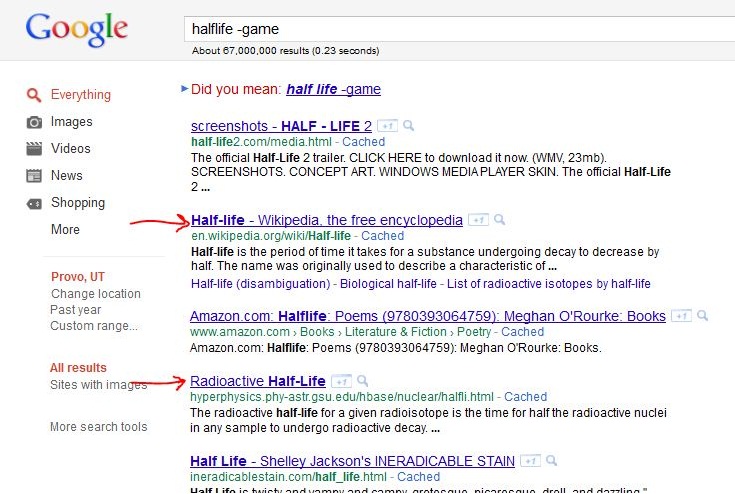The Power of Refining Your Search Queries
When searching for information online, it’s easy to get overwhelmed by the sheer volume of results. This is especially true when searching for topics with ambiguous keywords or phrases. However, by refining your search queries, you can significantly improve the accuracy of your search results. One effective way to do this is by learning how to exclude words from Google search. By excluding irrelevant words, you can narrow down your search results to get more precise information. In this article, we’ll explore the techniques and strategies for refining your search queries, including how to exclude words from Google search.
Refining your search queries is an essential skill in today’s digital age. With the vast amount of information available online, it’s crucial to know how to filter out unwanted results. By using specific search operators and techniques, you can save time and effort in finding the information you need. Whether you’re a student researching for a project, a professional looking for industry insights, or simply someone looking for answers to a question, learning how to refine your search queries can make a significant difference.
So, how do you refine your search queries? The first step is to understand the basics of Google’s search operators. Google provides a range of operators that can help you narrow down your search results. For example, you can use quotes to search for exact phrases, or the minus sign (-) to exclude specific words. By combining these operators, you can create complex search queries that yield more accurate results.
In the next section, we’ll delve deeper into Google’s search operators and explore how to use them to exclude words from search results. We’ll also discuss advanced search techniques and provide examples of common use cases for excluding words from Google search.
Understanding Google’s Search Operators
Google’s search operators are special characters and commands that can be used to refine search queries and get more accurate results. Two of the most useful search operators for excluding words from Google search are the minus sign (-) and quotes (“”) operators. The minus sign operator is used to exclude specific words from search results, while the quotes operator is used to search for exact phrases.
The minus sign operator is a powerful tool for excluding words from Google search. By placing the minus sign before a word, you can tell Google to exclude that word from the search results. For example, if you’re searching for information on “apple” but don’t want results about the fruit, you can use the search query “apple -fruit” to exclude results that contain the word “fruit”. This can be especially useful when searching for topics with ambiguous keywords.
The quotes operator is another useful tool for refining search queries. By placing quotes around a phrase, you can tell Google to search for that exact phrase. For example, if you’re searching for information on “how to exclude words from Google search”, you can use the search query “”how to exclude words from Google search”” to get results that contain that exact phrase. This can be especially useful when searching for specific information or quotes.
Google’s search operators can be combined to create complex search queries that yield more accurate results. For example, you can use the minus sign operator and quotes operator together to exclude specific words from search results and search for exact phrases. By mastering Google’s search operators, you can take your search skills to the next level and get more accurate results.
In the next section, we’ll explore how to use the minus sign operator to exclude specific words from search results, including how to combine it with other search operators.
Using the Minus Sign Operator to Exclude Words
The minus sign operator is a powerful tool for excluding words from Google search. By placing the minus sign before a word, you can tell Google to exclude that word from the search results. For example, if you’re searching for information on “how to exclude words from Google search” but don’t want results about the Google algorithm, you can use the search query “how to exclude words from Google search -algorithm” to exclude results that contain the word “algorithm”.
Another example of using the minus sign operator is when searching for a specific topic, but wanting to exclude a particular subtopic. For instance, if you’re searching for information on “how to learn French” but don’t want results about language learning apps, you can use the search query “how to learn French -apps” to exclude results that contain the word “apps”.
The minus sign operator can also be combined with other search operators to create more complex search queries. For example, you can use the minus sign operator with the quotes operator to search for an exact phrase and exclude specific words. For instance, if you’re searching for information on “how to exclude words from Google search” and want to exclude results that contain the word “tips”, you can use the search query “”how to exclude words from Google search”” -tips to get results that contain the exact phrase and exclude the word “tips”.
Additionally, the minus sign operator can be used to exclude multiple words from search results. For example, if you’re searching for information on “how to learn French” and want to exclude results that contain the words “apps” and “software”, you can use the search query “how to learn French -apps -software” to exclude results that contain both words.
In the next section, we’ll explore how to exclude multiple words from search results using the minus sign operator, including how to separate words with spaces or commas.
Excluding Multiple Words with the Minus Sign Operator
When searching for information online, it’s not uncommon to want to exclude multiple words from search results. Fortunately, the minus sign operator can be used to exclude multiple words from search results. To do this, simply separate the words with spaces or commas.
For example, if you’re searching for information on “how to learn French” and want to exclude results that contain the words “apps” and “software”, you can use the search query “how to learn French -apps -software” to exclude results that contain both words. Alternatively, you can use commas to separate the words, like this: “how to learn French -apps,software”.
Another example of excluding multiple words from search results is when searching for a specific topic, but wanting to exclude multiple subtopics. For instance, if you’re searching for information on “how to start a business” and want to exclude results that contain the words “marketing” and “finance”, you can use the search query “how to start a business -marketing -finance” to exclude results that contain both words.
It’s worth noting that the order of the words doesn’t matter when using the minus sign operator to exclude multiple words. For example, the search query “how to learn French -software -apps” will produce the same results as the search query “how to learn French -apps -software”.
In addition to excluding multiple words, the minus sign operator can also be used to exclude phrases from search results. To do this, simply place the phrase in quotes and precede it with the minus sign. For example, if you’re searching for information on “how to learn French” and want to exclude results that contain the phrase “language learning apps”, you can use the search query “how to learn French -“language learning apps”” to exclude results that contain the phrase.
In the next section, we’ll explore how to use quotes to search for exact phrases, and how this can be combined with the minus sign operator to exclude words from search results.
Using Quotes to Search for Exact Phrases
When searching for information online, it’s often necessary to search for exact phrases rather than individual words. This is where the quotes operator comes in handy. By placing quotes around a phrase, you can tell Google to search for that exact phrase, rather than individual words.
For example, if you’re searching for information on “how to exclude words from Google search”, you can use the search query “”how to exclude words from Google search”” to get results that contain the exact phrase. This can be especially useful when searching for specific information or quotes.
The quotes operator can also be combined with the minus sign operator to exclude words from search results. For example, if you’re searching for information on “how to learn French” and want to exclude results that contain the word “apps”, you can use the search query “”how to learn French”” -apps to get results that contain the exact phrase and exclude the word “apps”.
Another example of using the quotes operator is when searching for a specific phrase, but wanting to exclude a particular word or phrase. For instance, if you’re searching for information on “how to start a business” and want to exclude results that contain the phrase “small business”, you can use the search query “”how to start a business”” -“small business” to get results that contain the exact phrase and exclude the phrase “small business”.
It’s worth noting that the quotes operator can also be used to search for exact phrases within a specific website or domain. For example, if you’re searching for information on “how to learn French” within the website “bbc.com”, you can use the search query “”how to learn French”” site:bbc.com to get results that contain the exact phrase and are from the website “bbc.com”.
In the next section, we’ll explore advanced search techniques, including the site and filetype operators, and how they can be used in conjunction with the minus sign operator to refine search results.
Advanced Search Techniques: Using Site and Filetype Operators
Google’s site and filetype operators are advanced search techniques that can be used to refine search results and exclude unwanted words. The site operator allows you to search within a specific website or domain, while the filetype operator allows you to search for specific file types.
For example, if you’re searching for information on “how to learn French” within the website “bbc.com”, you can use the search query “site:bbc.com how to learn French” to get results that are only from the website “bbc.com”. This can be especially useful when researching topics that are specific to a particular website or domain.
The filetype operator can be used to search for specific file types, such as PDFs or Word documents. For example, if you’re searching for information on “how to learn French” and want to find PDFs on the topic, you can use the search query “filetype:pdf how to learn French” to get results that are only PDFs.
Both the site and filetype operators can be combined with the minus sign operator to exclude words from search results. For example, if you’re searching for information on “how to learn French” within the website “bbc.com” and want to exclude results that contain the word “apps”, you can use the search query “site:bbc.com how to learn French -apps” to get results that are only from the website “bbc.com” and exclude the word “apps”.
Another example of using the site and filetype operators is when searching for information on a specific topic and wanting to find specific types of files. For instance, if you’re searching for information on “how to start a business” and want to find Word documents on the topic, you can use the search query “filetype:docx how to start a business” to get results that are only Word documents.
In the next section, we’ll explore common use cases for excluding words from Google search, including researching topics with ambiguous keywords and avoiding irrelevant results.
Common Use Cases for Excluding Words from Google Search
Excluding words from Google search can be useful in a variety of situations. One common use case is when researching topics with ambiguous keywords. For example, if you’re searching for information on “bank” but don’t want results about financial institutions, you can use the minus sign operator to exclude the word “financial” and get results about the bank of a river.
Another common use case is when avoiding irrelevant results. For instance, if you’re searching for information on “how to learn French” but don’t want results about language learning apps, you can use the minus sign operator to exclude the word “apps” and get results about language learning methods.
Excluding words from Google search can also be useful when searching for information on a specific topic but wanting to exclude results from a particular source. For example, if you’re searching for information on “how to start a business” but don’t want results from Wikipedia, you can use the minus sign operator to exclude the word “Wikipedia” and get results from other sources.
Additionally, excluding words from Google search can be useful when searching for information on a specific topic but wanting to exclude results that contain a particular phrase. For instance, if you’re searching for information on “how to learn French” but don’t want results that contain the phrase “language learning software”, you can use the minus sign operator to exclude the phrase and get results that don’t contain it.
By using the minus sign operator and other search operators, you can refine your search queries and get more accurate results. In the next section, we’ll offer best practices for refining search queries, including how to use a combination of search operators and how to iterate on search queries to get the desired results.
Best Practices for Effective Search Query Refining
Refining search queries is an essential skill for anyone who wants to get the most out of Google search. By using a combination of search operators and iterating on search queries, you can get more accurate results and find the information you need quickly and efficiently.
One of the best practices for refining search queries is to use a combination of search operators. For example, you can use the minus sign operator to exclude specific words, and then use the quotes operator to search for exact phrases. This can help you get more accurate results and avoid irrelevant information.
Another best practice is to iterate on search queries. This means trying different search queries and refining them based on the results you get. For example, if you’re searching for information on “how to learn French” and don’t get the results you want, you can try refining your search query by adding or removing keywords.
It’s also important to use specific keywords and phrases when refining search queries. This can help you get more accurate results and avoid irrelevant information. For example, if you’re searching for information on “how to learn French” and want to find resources for beginners, you can use the keyword “beginner” in your search query.
Additionally, using advanced search techniques such as the site and filetype operators can help you refine your search queries and get more accurate results. For example, if you’re searching for information on “how to learn French” and want to find PDFs on the topic, you can use the filetype operator to search for PDFs.
By following these best practices, you can refine your search queries and get more accurate results. Remember to always use a combination of search operators, iterate on search queries, use specific keywords and phrases, and use advanced search techniques to get the most out of Google search.







